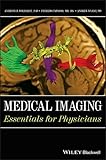Medical imaging : essentials for physicians / Anthony B. Wolbarst, Patrizio Capasso, Andrew R. Wyant.
Material type: TextPublication details: Hoboken, N.J. : Wiley-Blackwell, 2013.Edition: First editionDescription: 1 online resource (xxii, 411 pages) : illustrationsContent type:
TextPublication details: Hoboken, N.J. : Wiley-Blackwell, 2013.Edition: First editionDescription: 1 online resource (xxii, 411 pages) : illustrationsContent type: - text
- computer
- online resource
- 9781118480243
- 1118480244
- 9781118480267
- 1118480260
- 9781118480281
- 1118480287
- 616.07/54 23
- RC78.7.D53 W65 2013eb
- WN 180
Edition statement from running title area.
Includes bibliographical references (pages 400-402) and index.
Sketches of the standard imaging modalities: different ways of creating visible contrast among tissues -- Image quality and dose: what constitutes a "good" medical image? -- Creating subject contrast in the primary X-ray image: projection maps of the body from differential attenuation of X-rays by tissues -- Twentieth-century (analog) radiography and fluoroscopy: capturing the X-ray shadow with a film cassette or an image intensifier tube plus electronic optical camera combination -- Radiation dose and radiogenic risk: ionization-induced damage to DNA can cause stochastic, deterministic, and teratogenic health effects--and how to protect against them -- Twenty-first century (digital) imaging: computer-based representation, acquisition, processing, storage, transmission, and analysis of images -- Digital planar imaging: replacing film and image intensifiers with solid state, electronic image receptors -- Computed tomography: superior sontrast in three-dimensional X-ray attenuation maps -- Nuclear medicine: contrast from differential uptake of a radiopharmaceutical by tissues -- Diagnostic ultrasound: contrast from differences in tissue elasticity or density across boundaries -- MRI in one dimension and with no relaxation: a gentle introduction to a challenging subject -- Mapping T1 and T2 relaxation in three dimensions -- Evolving and experimental modalities -- Suggested further reading -- Index.
Print version record.
